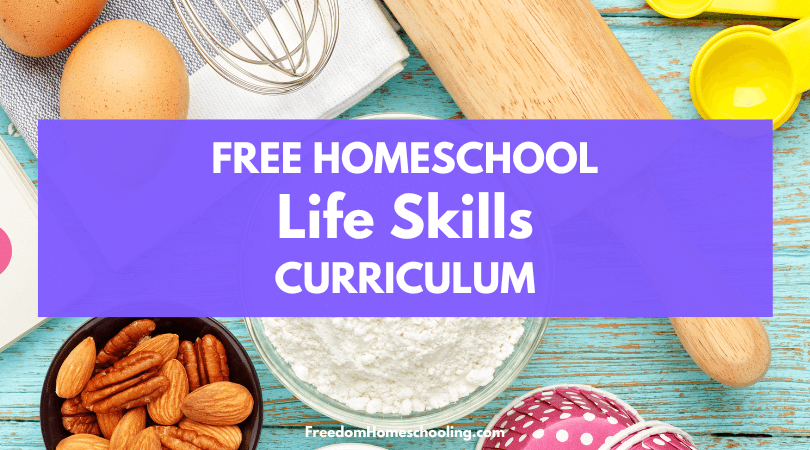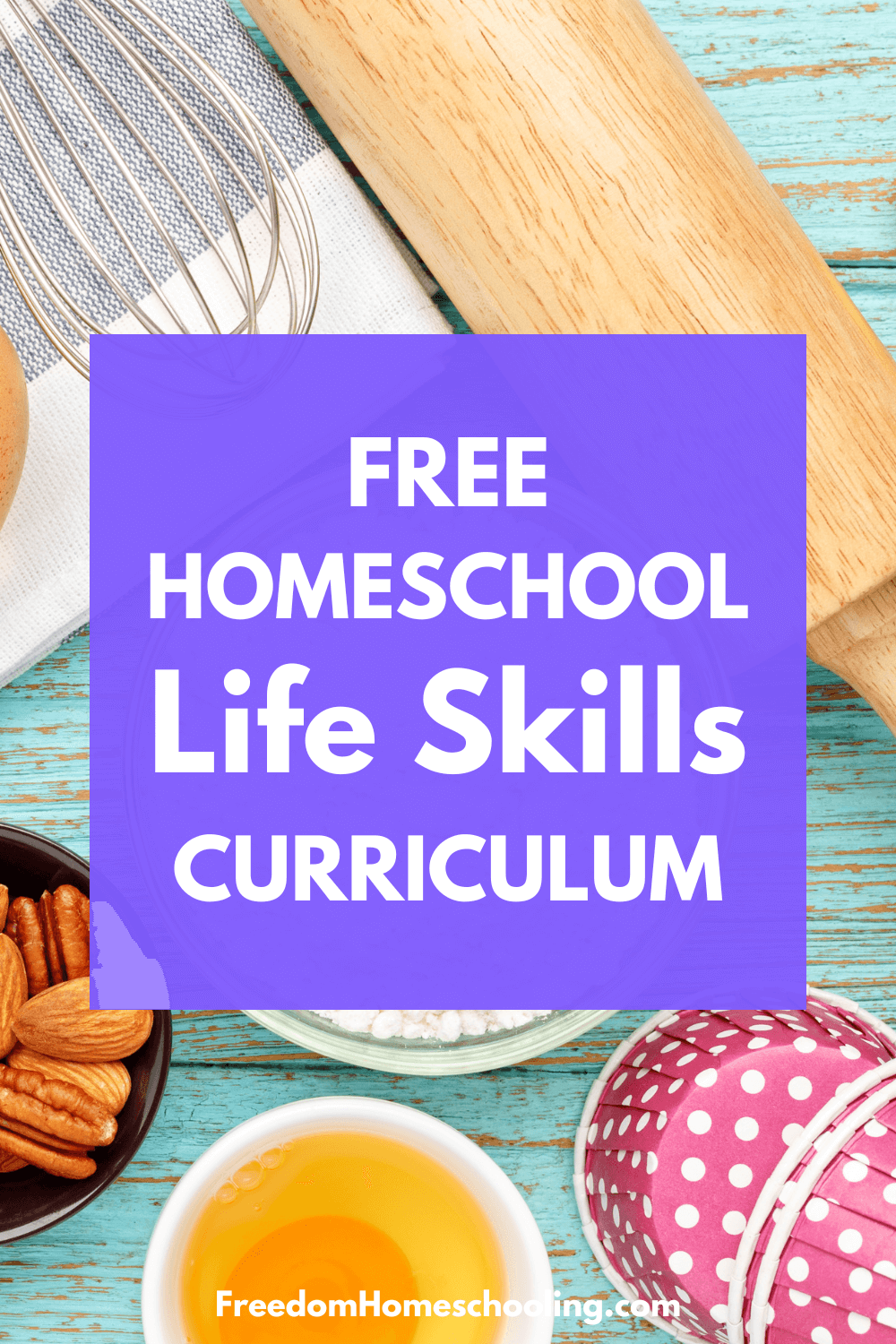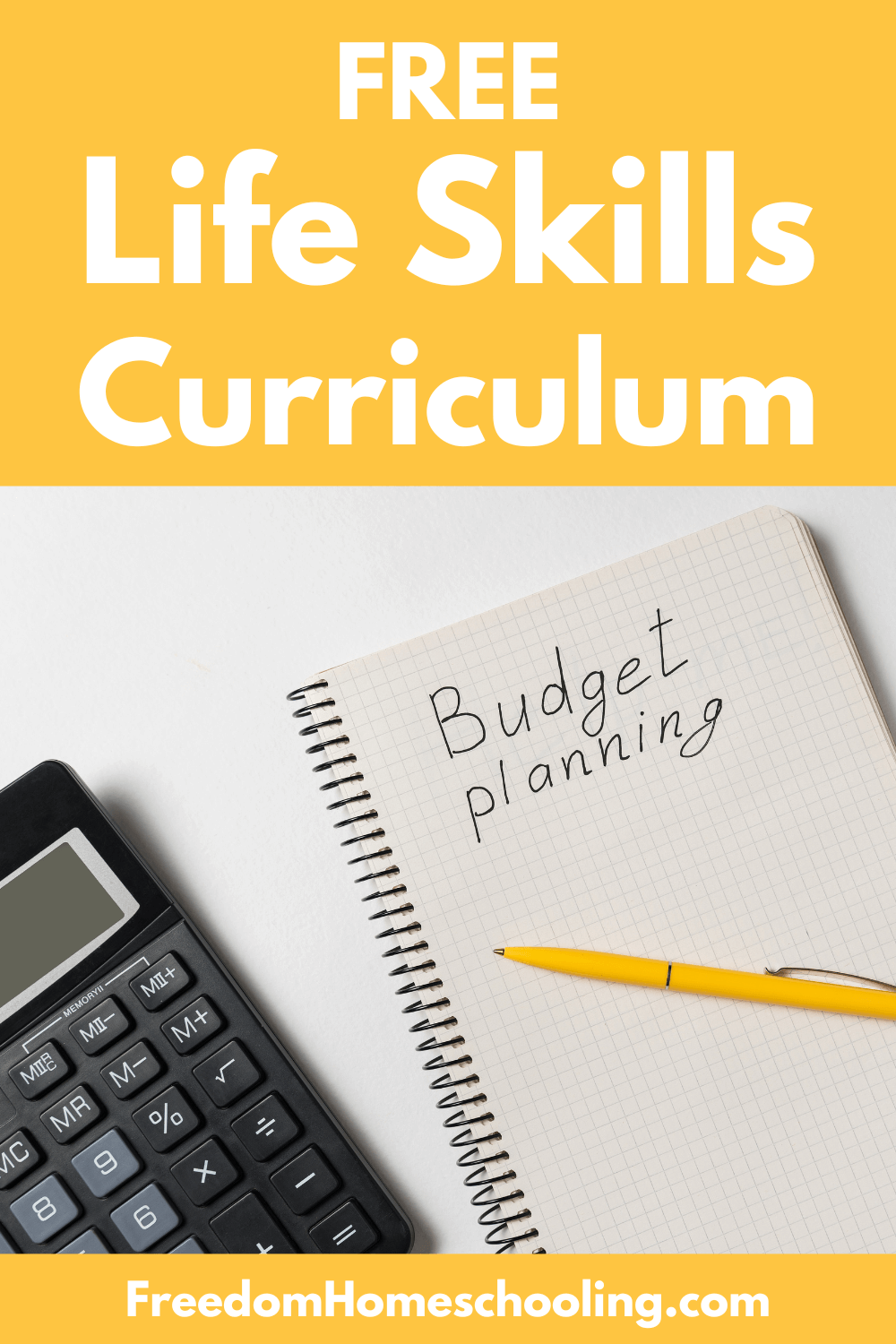Freedom Homeschooling
Free Homeschool Life Skills Curriculum

Welcome to our list of free homeschool life skills curriculum! Below, you’ll find free homeschool life skills curriculum for all ages.
How to Use the Free Life Skills Curriculum List
The life skills curriculum on this page is listed in alphabetical order. There is a suggested grade range next to the title of each curriculum resource. These are only approximate, so you may want to also consider resources above or below your child’s actual grade.
All the Christian resources on this list are labeled with a “C.” Any resource not labeled as Christian is either secular or neutral and does not teach religious beliefs unless otherwise noted.
If you would like to use any of the resources listed below, click on the curriculum’s title to visit their website. Then, follow the instructions found there to begin using the resource.
For other subjects, visit our homepage and choose a subject from the free curriculum menu found there. There are options for all the standard subjects and many electives.
This page contains affiliate links. See our complete disclosure for more information.
Free Life Skills Curriculum
Banzai! (3rd – 12th)
This website teaches personal finance skills using interactive lessons, real-life scenarios, games, and pre & post-tests. Some of the topics covered include credit, borrowing, budgeting, taxes, income, insurance, and more. When you sign up, you will be asked to select your school from a list. Click “can’t find school” and type “homeschool” for your school’s name.
Build Your Future (9th – 12th)
The Building Your Future series teaches students the essentials of personal finance. There are four downloadable books in the series: Banking, Financing, Investing, and Succeeding. Each student book has an accompanying teacher’s guide that includes handouts, answer keys, instruction, and assessment suggestions.
Civic Online Reasoning (6th – 12th)
These lessons, made available by the Stanford History Education Group, teach students how to evaluate online information. The materials are presented using online text, videos, and printable materials.
Consumer Financial Protection Bureau (K – 12th)
This organization provides a collection of downloadable financial literacy activities. Each activity comes with a teacher’s guide and supporting student materials. The activities can be used to integrate financial literacy into other subject areas or supplement an existing financial education curriculum.
Current Events (K – 12th)
This blog post contains links to numerous websites children and teens can use to read or watch current event news. It also recommends several resources parents can use to teach about media literacy.
ChooseFI (Pre-K – 12th)
ChooseFI’s financial literacy curriculum covers budgeting, investing, saving, income, taxes, entrepreneurship, and more. They provide downloadable lesson plans, slides, videos, activities, and assessments.
Common Sense Education (K – 12th)
This digital citizenship curriculum covers media balance, privacy & security, digital footprint, cyber bullying, and news & media literacy. The lessons include slide show presentations, videos, and printable handouts.
Crawford’s Auto Repair (9th – adults)
Crawford’s offers twelve lessons on automotive repair and maintenance in both video and eBook formats. There are also several additional videos on various auto care topics.
Dad, how do I? (4th – adults)
The videos on this YouTube channel cover many life skills, including auto maintenance, basic home repair and maintenance, using tools, how to tie a tie, shaving, ironing a dress shirt, and much more.
Dollars & Decisions (6th – 12th)
Dollars & Decisions is a game that teaches financial literacy skills. In the game, students choose a job, set a budget, and make financial decisions in a series of scenarios they might face in real life. In the process, they learn about budgeting, saving, and investing. At the end of the game, they’ll receive feedback based on how they played.
Driver’s Ed Guru (9th – adults)
This driver’s education course is designed to be taught by the parent and takes approximately six months to complete. A very detailed four-stage lesson plan is provided. Additionally, this website also offers DMV practice tests and many articles about driving safety.
Easy Peasy All-in-One Highschool Culinary Arts (6th – 12th)
This Culinary Arts course teaches cooking skills using video recipes and culinary math worksheets. The course is intended to take one semester to complete.
Everfi (6th – 12th)
Everfi offers numerous life skills courses covering topics including financial literacy, financial planning, credit fundamentals, career exploration, college & career readiness, and more. The courses include interactive online lessons and offline lesson plans.
Family Consumer Sciences (6th – 12th)
Family Consumer Sciences’ lesson plans cover child development, sewing, cooking, nutrition, interior design, personal finance, and many other life skills. The lesson plans include instructions, activities or labs, and printables.
Federal Reserve Education (K – college)
FRE provides a large collection of personal finance lessons. The downloadable lessons include teacher instructions, activities, student worksheets, and more.
First Aid (K – adults)
This page lists free courses, lesson plans, videos, and other resources for teaching first aid.
Fool Proof Me (6th – college)
Fool Proof Me teaches money skills, financial responsibility, and about the free enterprise system through the use of interactive, self-grading video-based modules.
FutureLearn (9th – college)
FutureLearn offers several online classes related to life skills, including job search skills, money management, and study skills. Length and format vary from course to course. The availability of courses periodically changes. Most of the courses are free to join, be there is an option to upgrade to access additional benefits, like the ability to qualify for a certificate.
Gardening as a Homeschool Elective (K – 12th)
This page includes tips on teaching gardening as a homeschool elective, links to free courses and guides, and a 16-page printable gardening planner.
Georgia Virtual Learning (8th – 12th)
Georgia Virtual Learning offers Financial Literacy and First Aid & Safety courses. These courses are taught using online text, slide shows, and videos. Assessments are not included.
Hands on Banking (4th – adults)
Hands on Banking teaches students money skills using video lessons. There are also downloadable instructor guides. Three levels are offered: Kids (for grades 4th and 5th), Teens (grades 6th through 8th), and Young Adults (ages 15 to 21).
HowTheMarketWorks.com (6th – college)
In this stock market game, users receive $100,000 in virtual money to invest so they can learn how the markets work and practice trading. The website also offers lesson plans, assignments, and informative articles for students to read.
In Charge (Pre-K – college)
This organization provides downloadable financial literacy lessons that cover budgeting, decision-making, buying a home, debt, comparison shopping, and more. The lessons include teacher’s guides, student materials, and PowerPoint presentations.
Keepers of the Faith (Pre-K – 12th) C
This Christian home economics/life skills curriculum consists of Keepers of the Faith for girls and Contenders of the Faith for boys. Both are available as downloadable books at two levels and include a parent’s guide. While both series cover a wide range of skills, the girls’ books focus more on traditional homemaking duties, while the boys’ books emphasize being a provider and household maintenance.
Khan Academy (9th – college)
Khan Academy offers the following life skills courses: College Admissions, Careers, Personal Finance, and Growth Mindset. The format varies by course, but most lessons are video-based.
Learn How to Become (9th – adults)
Learn How to Become assists with career choice and preparation. Information, including detailed job descriptions, outlook, average salaries, required education or training, and more, is given about a wide range of professions.
The Modern Pioneer Cookbook Curriculum (K – 12th)
This downloadable curriculum is designed to accompany The Modern Pioneer Cookbook. Each lesson features a different recipe from the cookbook, along with discussion questions, activities, and cross-curricular connections to math, science, history, and more. While the curriculum is free, you will need to purchase the cookbook.
Money Smart for Young People (Pre-K – 12th)
This downloadable curriculum, created by the FDIC, teaches financial literacy at four age-appropriate levels. The curriculum includes an educator’s guide, slides, student worksheets, and a parent guide.
Money Talks (8th – adults)
Money Talks is a financial literacy program that consists of downloadable student materials, comprehensive instructor guides, and videos. Topics covered include consumer skills, banking, credit cards, and employment.
NWT Literacy Council (9th – adults)
The Career-Life-Work series consists of ten separate downloadable workbooks: Career Development, Communications Skills, Dealing with Conflict, Dealing with Stress, Getting the Job, Goal Setting, Job Success Strategies, Personal Management Skills, Planning Your Career, and Soft Skills for Work. These books were written in Canada, but the information should also apply to students in other countries.
Overcoming Obstacles (K – 12th)
These downloadable lessons include teaching materials and student worksheets. The lessons cover positive character traits, problem solving, goal setting, conflict resolution, decision making, and many other life skills. At the high school level, there are also lessons on college, getting a job, work skills, and personal finances.
Parallel Alternative Strategies for Students: Consumer Math (9th – 12th)
This course covers budgeting, banking, borrowing, housing, taxes, investing, retirement, and more using a downloadable workbook and teacher’s guide. While it’s designed for students with special needs, other students may use it as well.
Parallel Alternative Strategies for Students: Life Management Skills (9th – 12th)
This course is designed to help students with various special needs succeed. It includes a student workbook and a teacher’s guide. The course covers caring for yourself, relationships, stress, nutrition, drugs, first aid, using money wisely, puberty, the reproductive system, and sexually transmitted diseases.
The Parent’s Supervised Driving Program (9th – 12th)
This website provides a series of skills-based lessons for parents to use when teaching their teens to drive. The website also provides tips for teaching teens to drive and offers a printable log or a downloadable app to track driving practice time.
Plain and not so Plain (6th – 12th) C
The following life skills courses are offered: Home Economics Kitchen Skills, Home Economics Household & Personal Management, and Life Skills for Young Men. Each course consists of 18 online or downloadable text-based lessons and should take one semester to complete.
Play Spent (5th – 12th)
Play Spent is an online simulation that takes participants through the decisions and challenges that low-income individuals face. Participants will do things like choose a job, choose a health plan, purchase groceries, and decide if they can afford things like new shoes and activities for their child. This simulation could be used to supplement a financial literacy curriculum.
Practical Money Skills (Pre-K – college)
Practical Money Skills offers money skills lessons organized by grade range. Topics range from basics for the very young, such as “What is Money?” to more comprehensive courses for teens and young adults. Downloadable lesson guides, worksheets, quizzes, and tests are provided.
PragerU Crash Course (7th – 12th)
This financial literacy course covers budgeting, buying, saving, debt, and more. The learning modules are video-based and include a comprehension quiz.
PWC (3rd – 12th)
PWC’s financial literacy curriculum covers financial decisions, home buying, debt, income, saving, insurance, and much more. Each lesson includes a lesson plan, video, and worksheet.
Skill Trek (K – 9th) C
Each week, Skill Trek provides a different life skill lesson for free on its Skill of the Week page. Each week’s lesson consists of a video and a printable. Skills covered may include topics in home maintenance, cleaning, gardening, personal finance, manners, technology, health, cooking, automotive, and more. Access to their complete library of lessons requires a paid membership.
Social Self (9th – adults)
Social Self offers over 500 guides covering conversation, body language, making friends, confidence, introversion & extroversion, social anxiety, and many other social skills topics. You do not need to join to read these guides.
A Standard Personal Finance Curriculum (9th – 12th)
This curriculum, made available by the Federal Reserve Bank of St. Louis, covers earning income, consumer skills, saving, investing, credit, and insurance. Each unit in the PDF text includes talking points, links to recommended resources, and a selection of supplemental resources.
SucceedSocially.com (9th – adults)
This website contains an extensive collection of articles on social skills and getting past social awkwardness. The articles are aimed at adults and older teens, but many of the ideas apply to younger children as well.
TD Bank Wow! Zone (K – 12th)
The downloadable financial literacy lesson plans on this website cover the history of money, responsible money choices, saving & investing, credit, budgeting, insurance, taxes, and more. The lesson plans include printable student worksheets.
Teach Your Kids to Cook With Free Resources (Pre-K – 8th)
This post contains downloadable cookbooks, YouTube channels, and websites to use while cooking with your children.
TeenBusiness.com (7th – 12th)
While not a curriculum, TeenBusiness.com is a news and information portal for young entrepreneurs, investors, inventors, and their parents/educators. There’s information on business plans, common business mistakes, record keeping, taxes, and much more.
Two Cents (5th – adults)
Two Cents is an educational show about personal finance. There are episodes about behavioral finance, retirement, smart shopping, careers & work, and more.
When Mother Lets Us Series (1st – 8th)
This series of books, which was written in the early 1900s, teaches many life skills, including cooking, carpentry, sewing, gardening, caring for pets, and more.
Youth Skills for LIFE (10th – 12th)
This downloadable curriculum helps young people learn the skills needed to transition into adulthood. Topics covered are career preparation, education, health & nutrition, housing & home management, risk prevention, and money management. While the curriculum is designed to be used in group homes or by foster parents, some of the material would likely be useful for all teens.
4-H Youth Babysitting (7th – 12th)
This course includes a downloadable student book, instructor guide, and worksheets. The lessons cover safety, child development, nutrition, entertaining children, and the business of babysitting.
Affordable Life Skills Curriculum (K – 12th) Some C
If you haven’t been able to find free life skills curriculum that meets your family’s needs, this post lists numerous affordable options to choose from. There are resources for teaching financial literacy, consumer math, career exploration, home & auto maintenance, cooking, home economics, and other general life skills.
Never Miss a New Free Resource!
We are constantly adding new free curriculum and resources to Freedom Homeschooling. The best way to make sure you never miss a new free resource is to subscribe to our newsletter using the form below.
Following us on social media, especially Pinterest and Facebook, is another great way to stay in touch and learn when we add new free resources to the site.
Did We Miss Something?
If you know of an amazing free curriculum that we didn’t include, please tell us about it. We’d love to take a look at it!
Report an Issue
If you have come across a broken link, a resource that is no longer free, incorrect information, something that isn’t working correctly, or any other issue, please let us know so we can fix it. We try very hard to ensure our website is up-to-date and free of errors, but unfortunately, mistakes still happen, and free resources sometimes change or end.
Have Questions?
If you need more information or would like to contact us, please see our Frequently Asked Questions.



